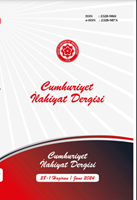Nahvî İhtimâlin İstişhâda Etkisi
The Effect of Syntactic Probability on al-Istishhād
Author(s): Abdulkadir KişmirSubject(s): Morphology, Syntax, Historical Linguistics, Sociolinguistics
Published by: Cumhuriyet Üniversitesi İlahyat Fakültesi
Keywords: Arabic Language; Nahw; Istishhād; Probability; Linguistic Material;
Summary/Abstract: Efforts to determine the general rules of Arabic have spread over a long historical period. Both early time nahw scholars and later period linguists actively participated in these studies by effectively using the materials provided by the Arabic language. However, linguists have followed different methods regarding the acceptance of linguistic materials. This situation has sometimes led to heated debates among grammarians. These debates have arisen either due to the uncertainty about which period the linguistic data belongs to, whether it was obtained from fusha Arabic speakers, or whether it is specific to any tribe, or whether the fusha material came with a sahih sanad, or they occured due to the content of linguistic material put forward as evidence. Thus, the idea that the linguistic data must meet certain conditions to be generally accepted has emerged. Especially, the idea that the expression to be presented as evidence by the nahw scholar in the linguistic material he/she deals with should be suitable for the given situation shows that the linguistic data undergoes textual criticism. This article discusses the probability which opens the door to different interpretations of an expression in the linguistic material presented as evidence and is considered a kind of critisism. The probability has been considered by many grammarians as a defect that hinders the iḥtijāj. However, it is also observed that such linguistic material is used in the process of al-istišhād. Therefore, some grammarians, such as Abū Ḥayyān, have stated that such evidence should not be considered. However, the different interpretations of grammarians about whether there is a probability in any linguistic text bring up the problem of whether the probability is used objectively. Our aim is to reveal the perpective of the objective value of this rule, which is expressed as "The presence of probability in linguistic evidence prevents istišhād with it." and evaluates the suitability of linguistic data for istišhād through the probability. The issue is significant because probability is considered a situation that affects the istišhād activity. In this article, which uses the literature review method and is thought to be different from existing academic studies, after touching upon the historical process of the probability, this concept is examined under different headings, and although there are statements that the probability requiring the rejection of evidence should be strong and distant possibilities should not be considered, the discussions among linguists about whether the evidence expresses probability or not cannot be resolved objectively because criterias have not been established. Thus, an attempt is made to reveal the objective value of the requirement that the probability in linguistic evidence prevents the istišhād. In this article, which is based only on the probability among the different situations that prevent istišhād, it has been concluded that the rule in question is used by grammarians but cannot be attributed to objective criteria. Because, even in the example given on the subject in the methodological Nahw works, the existence of the probability is discussed.
Journal: Cumhuriyet İlahiyat Dergisi
- Issue Year: 28/2024
- Issue No: 1
- Page Range: 264-283
- Page Count: 20
- Language: Turkish

